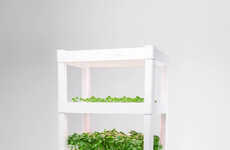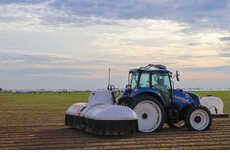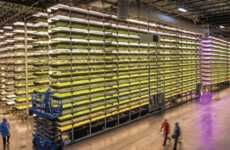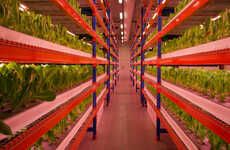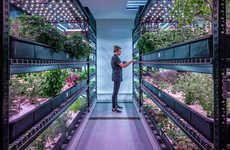
Iron Ox Farms Yields Massive Amounts of Leafy Greens
Justin Lam — October 16, 2018 — Eco
References: ironox & digitaltrends
Founded by a former Google software engineer, the Iron Ox Farm is staffed almost exclusively by robots and aims to produced leafy greens at a rate of 26,000 heads per year. Occupying an 8,000-square-foot indoor facility, the mechanical farm may seem small compared to large outdoor farms, but it still manages to yield large crops through smart technology.
Firstly, Iron Ox functions as a hydroponics farm. This method of farming replaces the soil with mineral nutrient solutions in a water solvent. Secondly, the farm utilizes a 1,000-pound robot known as Angus. Angus primarily handles the tending of the crop with precise mechanical accuracy.
Ultimately, Iron Ox farms aims to modernize the farming industry in a way that is more efficient, uses less space and produces food in a more eco-friendly way.
Firstly, Iron Ox functions as a hydroponics farm. This method of farming replaces the soil with mineral nutrient solutions in a water solvent. Secondly, the farm utilizes a 1,000-pound robot known as Angus. Angus primarily handles the tending of the crop with precise mechanical accuracy.
Ultimately, Iron Ox farms aims to modernize the farming industry in a way that is more efficient, uses less space and produces food in a more eco-friendly way.
Trend Themes
1. Automated Robotic Farms - Automated robotic farms are revolutionizing the farming industry by increasing efficiency, reducing space requirements, and promoting eco-friendly practices.
2. Hydroponics Farming - Hydroponics farming is disrupting traditional soil-based agriculture by replacing it with mineral nutrient solutions in a water solvent, allowing for higher crop yield and better resource management.
3. Robot-assisted Crop Tending - Robot-assisted crop tending, exemplified by the use of the 1,000-pound robot Angus at Iron Ox Farm, demonstrates the potential for precise and efficient agricultural automation, reducing labor costs and improving crop quality.
Industry Implications
1. Farming - The farming industry stands to benefit from the adoption of automated robotic farms, as it enables higher productivity, reduces labor costs, and promotes sustainable practices.
2. Agtech - The AgTech industry can capitalize on the trend of hydroponics farming by developing innovative solutions for nutrient management, water conservation, and controlled environment agriculture.
3. Robotics and Automation - The robotics and automation industry can explore opportunities in robot-assisted crop tending, creating advanced machines for precision farming, reducing manual labor, and increasing agricultural productivity.
6.7
Score
Popularity
Activity
Freshness




